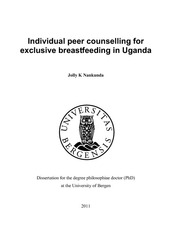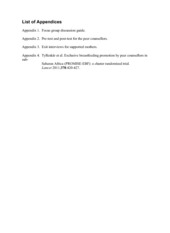| dc.contributor.author | Nankunda, Jolly | en_US |
| dc.date.accessioned | 2012-02-13T13:14:43Z | |
| dc.date.available | 2012-02-13T13:14:43Z | |
| dc.date.issued | 2012-02-06 | eng |
| dc.identifier.isbn | 978-82-308-1949-4 (print version) | en_US |
| dc.identifier.uri | https://hdl.handle.net/1956/5607 | |
| dc.description.abstract | Introduction Breastfeeding remains a potent child survival strategy estimated to save up to 1.5 million infant deaths every year when optimally practiced. Despite breastfeeding being universal in most of sub-Saharan Africa, exclusive breastfeeding (EBF) is rarely practiced. Peer counselling for EBF, particularly in non-African settings, has been reported to lead to increased EBF levels. This thesis explores the experiences from the process of setting up a community-based individual peer counselling intervention for support of EBF in a trial in Eastern Uganda, and assesses its effect on mothers who opted to breastfeed. Methods This thesis is composed of three sub-studies done within a multi-centre cluster-randomized behavioural intervention trial (PROMISE-EBF) to assess the effect of individual peer counselling on EBF rates as one of its primary objectives. The trial took place in Burkina Faso, Uganda, Zambia and South Africa, but the focus of this thesis was on the process of setting up the peer counselling in the Ugandan urban and rural sites. The first sub-study assessed by qualitative methods the feasibility of training rural women as peer counsellors for EBF in the Iganga district in preparation for the main study. The next sub-study also used qualitative methods to explore the process of selection, training and follow-up of peer counsellors for the PROMISE-EBF trial in the Mbale district. The peer counsellors were given a pre- and post-test questionnaire to assess the effect of training and follow-up on their knowledge and attitudes towards EBF. Observations made during the study and field notes were used to understand this process. The last sub-study was cross-sectional following completion of the peer counselling visits which explored the perceptions and experiences of the supported women and how they felt about the peer counselling intervention. For this sub-study, we employed a mixed methods approach (qualitative and quantitative) and a semi-structured questionnaire for data capture. Results Training rural women with modest formal education to help their peers with breastfeeding proved feasible. Peer counselling for EBF was acceptable to the communities where it had been introduced by systematically involving community members and getting them, to participate in the selection process. The peer counsellors appreciated supervisory visits, which offered a venue for sharing their achievements and challenges. In the PROMISE-EBF study in Mbale, all the peer counsellors worked throughout the entire duration of the trial. Before training, the peer counsellors had some knowledge gaps and negative attitudes regarding EBF, but were positively influenced by the training and follow-up. The supported women were happy to have someone familiar from their community sit with them at home to help them with breastfeeding practices. The women receiving counselling were generally satisfied with its different aspects. Satisfaction was most prominent within the group that received 5 or more visits compared to the group that received <5 visits (80% versus 59%, p <0.001). The fathers and grandmothers influenced the infant feeding decisions adopted by the mothers. Conclusions Systematic planning and implementation of the peer counselling intervention for EBF was useful for making it acceptable to the community. Peers offered huge potential for breastfeeding support that was highly accepted among the supported mothers. In this rural Ugandan community where infant feeding decisions were made in consultation, involving other members of the family - especially the fathers and grandmothers - during the process of peer counselling appeared to improve the desired behaviour of practising EBF. In case of scale-up of this intervention, the main points to emphasise include: community involvement, proper training using appropriate culturally sensitive curricula and effective support supervision for the peer counsellors. | en_US |
| dc.language.iso | eng | eng |
| dc.publisher | The University of Bergen | eng |
| dc.relation.haspart | Paper I: Jolly Nankunda, James K Tumwine, Åshild Soltvedt, Nulu Semiyaga, Grace Ndeezi, Thorkild Tylleskär: Community based peer counsellors for support of exclusive breastfeeding: experiences from rural Uganda. International Breastfeeding Journal 2006; 1:19. The article is available at: <a href="http://hdl.handle.net/1956/1962" target="blank">http://hdl.handle.net/1956/1962</a> | en_US |
| dc.relation.haspart | Paper II: Jolly Nankunda, Thorkild Tylleskär, Grace Ndeezi, Nulu Semiyaga, James K Tumwine: for the PROMISE-EBF Study Group. Establishing individual peer counselling for exclusive breastfeeding in Uganda: implications for scaling-up. Maternal and Child Nutrition 6(1): 53–66, January 2010. Full text not available in BORA due to publisher restrictions. The article is available at: <a href="http://dx.doi.org/10.1111/j.1740-8709.2009.00187.x" target="blank"> http://dx.doi.org/10.1111/j.1740-8709.2009.00187.x</a> | en_US |
| dc.relation.haspart | Paper III: Jolly Nankunda, James K Tumwine, Victoria Nankabirwa, Thorkild Tylleskär, for the PROMISE-EBF Study Group. “She would sit with me”. Mothers’ experiences of individual peer support for exclusive breastfeeding in Uganda. International Breastfeeding Journal 2010;5:16. The article is available at: <a href="http://hdl.handle.net/1956/4335" target="blank">http://hdl.handle.net/1956/4335</a> | en_US |
| dc.title | Individual peer counselling for exclusive breastfeeding in Uganda | en_US |
| dc.type | Doctoral thesis | |
| dc.rights.holder | Copyright the author. All rights reserved | |
| dc.subject.nsi | VDP::Medical disciplines: 700::Health sciences: 800::Community medicine, Social medicine: 801 | eng |

